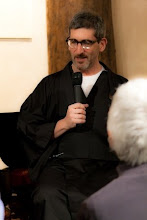Some Exercises:
1. Stand at the seashore and listen to the waves. Consider that these waves were crashing on the beach, making these sounds, when humans first organized into civilizations 10,000 years ago, when humans first began to hunt and gather on the plains of
2. At sunset look toward where the sun has just set, there over the horizon and then consider how the ground upon which you stand is this spherical planet Earth which circles the sun. Think about the sun over there and the Earth over here and picture the solar system in your mind.
Look up: Do you see the moon? Picture the sun over there, the Earth here, circling the sun, the moon there, circling the Earth. During the next few months, if you're facing south look up and find the brightest "star" you can see - it will have a faint orange tinge. That's no star. That's Mars.
Experience standing in the solar system, not as a concept of balls and circles in a picture of your mind's eye, but right here, right now. Don’t conceptualize the solar system, experience the solar system.
To get updated information about what's in the sky each week, go here: http://www.skyandtelescope.com/observing/ataglance/
3. Stand at a busy intersection of
And just as all those people have died while the city continues, all the people you see today, on this corner, including yourself, will also die, one by one, completely disappearing by 120 years from now.
Yet the city will remain and those New Yorkers of the future will feel themselves to be as much “the City” as you feel yourself to be now. What is the city? What are you as part of the city? Contemplate the passing of time beyond the scale of your own life.
4. Look at the moon. If you could have stood on the Earth 4 billion years ago after a planetoid hit the Earth, throwing rock and dust into orbit, you would have seen a ring, like those of Saturn. If you could have stood there watching it as millions and millions of years pass, you would have seen them gradually pulling together into a rocky cluster that, bit by bit, would have coalesced into our perfectly spherical moon.
Stand there and think about how the moon as a ring could have been experienced, billions of years ago, as directly and concretely as you experience that sphere today. Consider the dynamic nature of the universe and how coddled and protected we’ve been in our tiny window of a few hundred thousand years of humanoid existence.
More details about formation of the moon here: http://www.psi.edu/projects/moon/moon.html
5. Watch a docudrama (I enjoyed “John Adams”, for example, in this way) and consider how the people of past generations experienced themselves as though they were the leading edge of the long story of history that preceded them, filled with uncertainty about what would come, experiencing the world as unfolding “then and there” as you experience it unfolding right here and now.
We now consider them “history”, the middle of a story that has led to you. Consider how someone 100 years from now, viewing a film of you, will think of you as “the middle” of her or his own stories. What is it like being the middle of someone else’s story, rather than the unfolding, leading edge of your own?


Good moon for exercise 4 tonight!
ReplyDelete